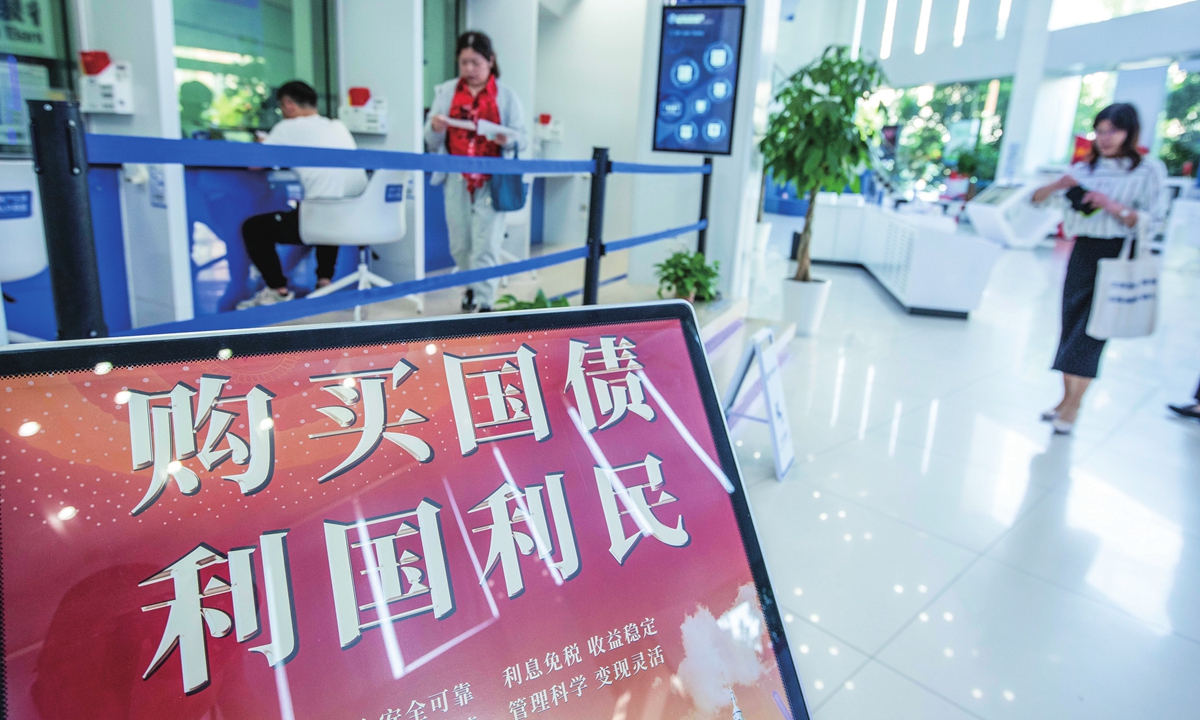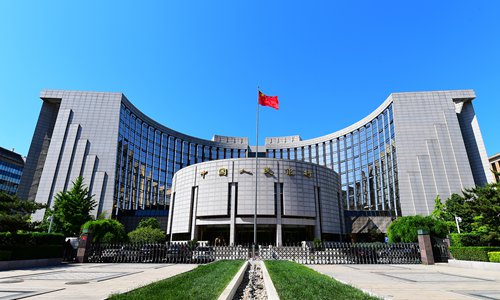China issues second batch of ultra-long special treasury bonds, boosting market expectations on country’s long-term development prospects

An advertisement for national bonds is displayed inside a bank in Hai'an city, Nantong, East China's Jiangsu Province on May 24, 2024. A total of 40-billion-yuan ($5.63 billion) worth of 20-year ultra-long-term special government bonds are being issued as part of a massive 1-trillion-yuan planned sale of such bonds. The issuance is an important part of this year's proactive fiscal policies. Photo: VCG
China issued 40-billion-yuan ($5.63 billion) worth of 20-year ultra-long special treasury bonds on Friday, as part of a massive 1-trillion-yuan planned sale of such bonds. It is also the issuance of the second batch of 1-trillion-yuan bonds, after the first batch debuted in the market on Wednesday and received solid demand.
Industry insiders expect the effect of the series of bond issuances in May on the Chinese economy to be seen in the second half, not only providing long-term capital support to strategic industries such as high tech, energy security, and basic infrastructure but also boosting market confidence and expectations on the long-term development prospects of the world's second-largest economy.
The issuance is also an important part of this year's proactive fiscal policies, which are set to coordinate with other monetary policies and stimulus measures to generate a synergy effect, propelling the economy to expand at about 5 percent and reaching this year's GDP goal, observers said.
The second-batch of the bonds, with an interest rate of 2.49 percent, was issued by the Beijing Stock Exchange on Friday morning. According to the Ministry of Finance, the distribution of the bonds will start on May 27, primarily targeting institutional investors. Trading will commence on May 29.
Industry insiders predicted that institutional and individual investors' bullish sentiment, as reflected in the trading of the first batch of bonds, will continue for the second batch.
The first batch of the 30-year bonds jumped more than 13 percent at the open on Wednesday, also the trading debut day, prompting a 30-minute suspension by the Shanghai Stock Exchange, according to media reports. The Shenzhen-listed notes were also suspended from trading after rising more than 20 percent.
"The popularity of the trading shows that the bonds issuance has been effective in utilizing idle funds to support the country's medium- and long-term development plans, thereby promoting sustained and sound economic growth," Tian Yun, a Beijing-based veteran economist, told the Global Times on Friday.
China announced plans to issue the 1-trillion-yuan ultra-long special treasury bonds in March, as part of a broader move to bolster the economy. The bond sales, which include 20-year, 30-year and 50-year maturities, will continue through November, according to the Ministry of Finance.
Chinese officials stressed the significance of issuing ultra-long-term special-purpose government bonds to effectively support major strategies and the development of security capabilities in key areas.
According to a research note from CMC Securities, the second batch of bonds is expected to be mainly invested in two fields: security and long-term development. Examples include sectors key to technological self-sufficiency, defense security, energy and resource security, futurist industry development, as well as the high-quality development of the Chinese population.
Tian said that he expected transfer payments to local governments to be another focal area of investment.
"The ultra-long special treasury bonds will not be included in the budget deficit, so the issuance of the ultra-long special treasury bonds also offers timely alleviation to local governments' financing strains and debt problems," Li Chang'an, a professor at the Academy of China Open Economy Studies of the University of International Business and Economics, told the Global Times on Friday.
Observers also see the series of debt issuances as sending out a positive signal that Chinese policymakers are leveraging proactive fiscal policy to better support the development of the economy amid rising internal and external downward pressure, such as insufficient domestic demand.
"Proactive fiscal policy is a crucial macroeconomic tool for stimulating demand. It has both the transmission and multiplier effects, which is critical for the expansion of the national economy. In other words, one unit of fiscal expenditure can potentially lead to multiple units of total social expenditure," Li said.
Meanwhile, it is expected that monetary policy stimulus, such as a reserve requirement ratio (RRR) cut as soon as in the second quarter, could be carried out to coordinate with the debt issuance and amplify the combined positive influence on the economy.
A Communist Party of China Central Committee Political Bureau meeting on April 30 stressed that the country should front-load efforts to effectively put the established macro policies in place, and properly implement a proactive fiscal policy and a prudent monetary policy.
Observers noted that it would take two to three months for the effects of the ultra-long-term treasury bonds issuance to bear fruit, and that in turn would elevate the whole-year GDP growth by 0.1-0.3 percent.
China's Foreign Ministry said on Friday that China's economy has seen a good start this year, with positive factors in economic operations continuing to amass.
"We are confident in achieving the annual growth target [of around 5 percent]," the ministry said, citing a recent report by the United Nations Department of Economic and Social Affairs, which upgraded the forecast for Chinese economic growth by 0.1 percentage point to 4.8 percent.


